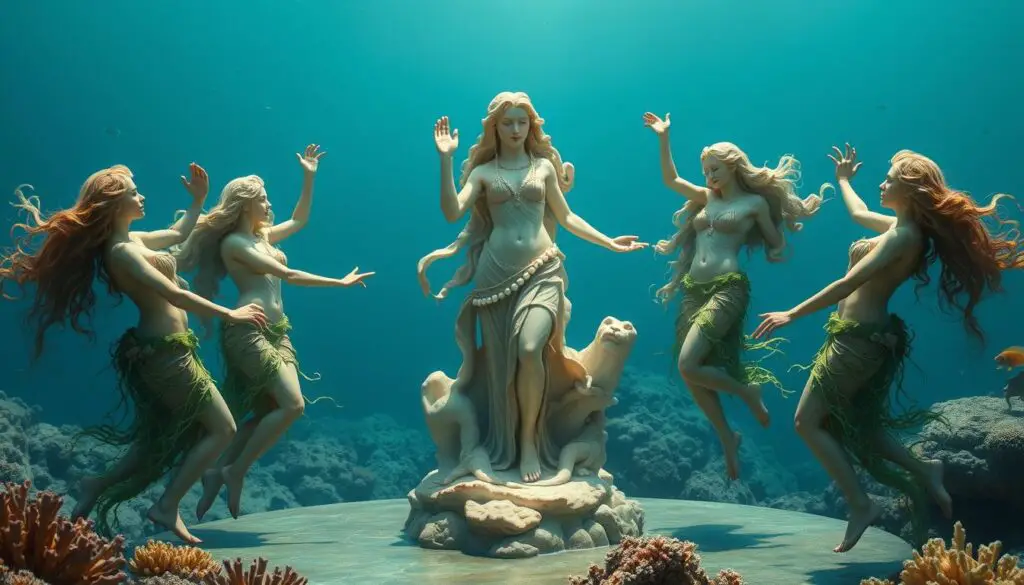In the vast tapestry of ancient Greece, Thetis stands out as an oceanic deity of profound importance.
A revered member of the Nereids, Thetis, the sea nymph, graces the lore of Greek mythology not only as a nurturing mother but also as a central figure intertwined with the destiny of gods and mortals alike.
Distinct from figures such as the sea goddess Tethys and the embodiment of law, Themis, Thetis’ stories echo the power and mystery of the sea itself.
As the mother of Achilles, the legendary hero of the Trojan War, Thetis’ influence reaches far and wide.
Her abode, the sea, is essential to the religious and mythological fabric of ancient Greece.
Renowned for her beauty and wisdom, Thetis plays multifaceted roles, from protecting deities to shaping the fates of men, further cementing her legacy as an enduring figure in Greek mythology.
Key Takeaways
- Thetis is one of the 50 Nereids, highlighting her prominent status among sea nymphs.
- She is the daughter of Nereus and Doris, emphasizing her divine parentage.
- Thetis’ marriage to Peleus played a crucial role in the events of the Trojan War.
- She is remembered for her attempts to make Achilles, her son, immortal, showcasing her protective nature.
- Thetis had significant connections and influence among other deities in Greek mythology.
The Origins of Thetis

Thetis, an illustrious figure within Greek mythology, boasts a remarkable lineage that interweaves effortlessly with the pantheon of Greek gods and Greek deities.
Her divine ancestry not only underscores her significant role in the mythological tradition but also highlights her preeminent status among the mythological sea nymphs.
Parentage and Birth of Thetis
Thetis was born from the union of the ancient sea god Nereus and the Oceanid Doris.
Nereus, often lauded as the “Old Man of the Sea,” was renowned for his gentle nature and unerring wisdom.
Doris, an Oceanid, further enriches Thetis’ illustrious parentage, combining both sea and freshwater realms in her divine ancestry.
This exceptional pedigree solidifies Thetis’ prominent position among the Greek deities.
Links to Nereus and Doris
Firmly rooted in the heritage of Greek gods, Thetis’ connection to Nereus and Doris places her at the heart of Greek mythological narratives.
As one of Nereus’ fifty daughters, Thetis stands out due to her pivotal role among the Nereids.
Her divine ancestry, stemming from the union of Nereus and Doris, illustrated a remarkable convergence of the forces of the sea and river, making her an indispensable part of the Greek mythological tapestry.
Role in Greek Mythology

Within the vast tapestry of Greek myths, Thetis stands out as a remarkable figure.
Born to Nereus and Doris, she is one of the fifty sea nymphs known as the Nereids.
Her influence and leadership among these nymphs are undeniable.
Thetis and the Nereids
Thetis’s involvement with the Nereids underscores her significant role in Greek mythology.
As a leader among these sea nymphs, she exemplifies the beauty, grace, and wisdom associated with their kind.
The Nereids, daughters of the sea god Nereus, are often depicted aiding sailors and calming storms.
Thetis, in particular, is noted for her compassionate interventions and guidance, reinforcing her leadership qualities.
As Leader of the Sea Nymphs
The leadership of Thetis is further highlighted by her associations with major gods, such as Poseidon and Amphitrite.
Her authoritative presence among the Nereids denotes not only her exceptional beauty but also the respect she commands.
The wedding of Thetis to Peleus, a mortal, was indeed a testament to her allure, drawing deities from across the pantheon to bestow divine gifts upon the couple.
This grand affair, attended by gods, underscores her pivotal role in intertwining human and divine narratives within Greek mythology.
Moreover, Thetis’s son, Achilles, prophesied to be greater than his father, showcases her influence extending beyond the sea to the epic tales of the Trojan War.
By attempting to protect and immortalize Achilles, Thetis’s actions reflect a deep maternal instinct intertwined with her divine responsibilities.
Her engagements in divine conflicts and her nurturing nature toward other gods like Dionysus further cement her standing as a revered figure in Greek myths.
Myths Involving Thetis

Thetis, a prominent Nereid, figures greatly in various mythological tales, cementing her importance in Greek mythology.
Prophecy of Thetis’ Son
An ancient prophecy foretold that Thetis would bear a son greater than his father.
This prediction deterred gods like Zeus and Poseidon from marrying her, leading her to wed the mortal Peleus.
The result of this union was Achilles, one of the most celebrated heroes of Greek myth.
Thetis and Her Transformations
Renowned for her ability to transform, Thetis could change her shape at will, exemplifying the theme of shape-shifting in Greek prophecies.
Myths recount her transforming into various entities, including a flame, water, a lioness, and a serpent.
These narratives highlight her adaptability and formidable presence in Greek tales.
The Marriage to Peleus
The marriage of Thetis to Peleus stands as a cornerstone event in Greek mythology, celebrated not only for its significance but for the celestial influences that marked its occurrence.
This divine matrimony was shaped by events that showcased the powers of transformation and wisdom prevailing in ancient times.
Proteus’ Advice to Peleus
Before winning Thetis’ hand, Peleus sought the guidance of Proteus, the wise old sea god known for his shape-shifting abilities.
Following Proteus’ advice, the hero would be well-prepared to confront the challenges that lay ahead, ensuring that his pursuit of Thetis would align with divine approval and strategic insight.
The Shape-Shifting Challenge
To gain Thetis’ favor, Peleus had to engage in a battle of wits and strength.
Thetis, as a sea goddess, possessed remarkable shape-shifting abilities, transforming herself into various forms to evade capture.
Through determination and perseverance, Peleus managed to restrain Thetis, compelling her to marry him.
Their union was commemorated in a grand celebration, emphasizing the celestial and historic importance of this divine matrimony.
The marriage was celebrated on Mount Pelion with the attendance of gods and goddesses.
Apollo played the lyre while the Muses sang, creating an atmosphere of divine joy.
Notable gifts included Chiron’s ashen spear polished by Athena and Hephaestus-forged blade, as well as Poseidon’s immortal horses.
However, Eris, the goddess of discord, introduced chaos by throwing a golden apple into the gathering, sowing seeds of discord among Hera, Athena, and Aphrodite, ultimately leading to a series of events culminating in the Trojan War.
The significance of this marriage transcends the narrative of love and struggle, highlighting the impact that divine interventions and intricate prophecies undeniably had on the lives of mortals and gods alike.
Mother of Achilles

Thetis, often revered as a goddess in her own right, plays an influential role in the legendary “Iliad”.
As the mother of Achilles, the foremost Greek warrior in the Trojan War, her presence in heroic epics is undeniable.
Thetis’s attempts to bestow “immortality” upon Achilles underscore her powerful “motherhood” and the profound impact she had on Greek mythology.
The Significant Role in the Iliad
In the “Iliad”, Thetis’s motherly deeds are pivotal. Particularly memorable is her provision of impregnable armor to Achilles, an act driven by the tragic death of his close friend, Patroclus.
Homer immortalizes Thetis’s desperate pleas to Hephaestus to forge this divine armor, accentuating her unwavering dedication and the tenacity of her maternal love.
Attempts to Make Achilles Immortal
The myth of Achilles’s partial invulnerability, attributed to Thetis’s meticulous attempts, is a cornerstone of his legend.
She is famously depicted dipping him into the River Styx, a scene immortalized by artists like Rubens and Quellinus.
However, as fate would have it, his heel—the part by which she held him—remained vulnerable, leading to the term “Achilles Heel”.
This act reflects Thetis’s profound desire to shield her son from the mortal sorrows that plague “heroic epics”.
To explore more about Thetis’s enduring influence, read this detailed article which delves into her broader mythological significance.
Thetis in the Trojan War

The engagement of Thetis in the Trojan War underscores her critical role among the Greek heroes and highlights the profound influence of mythology on the epic tales of ancient Greece.
Often depicted as a compassionate mother, Thetis’ actions, whether directly or indirectly, had a substantial mythology impact on the sequence of events that defined the Trojan saga.
The Wedding and its Impact
The wedding of Thetis and Peleus was no less grand than a tale plucked from the annals of legend.
Attended by all the gods and goddesses, this monumental event undeniably set the stage for the Trojan War.
Thetis received a jeweled crown from Aphrodite, while Peleus was gifted two immortal horses, Xanthus and Balius.
The union was celebrated with divine splendor, aligning the mortal realm with the celestial, and initiating a chain of events leading to the epic conflicts involving Greek heroes like Achilles.
The wedding feast, disrupted by the uninvited Eris, introduced the fateful “Apple of Discord,” which eventually culminated in the decade-long war.
This episode is a profound example of how intertwined Thetis’ personal life became with the larger narrative of the Trojan War.
The Role in Heroic Legends
Throughout heroic legends, Thetis exhibited her potency and care, particularly concerning her son Achilles.
Her efforts to make him immortal are well-chronicled, ranging from anointing him with ambrosia to dipping him into the River Styx.
Such acts not only elevated Achilles among the Greek heroes but also highlighted Thetis’ vital significance in these mythological frameworks.
Moreover, her guidance and protective instincts were evident when she disguised Achilles as a woman to prevent his participation in the impending conflict.
This complex quilt of stories demonstrates the breadth of mythology impact Thetis had on the destinies of heroes and the unfolding of one of history’s most narrated wars.
Deity Associations

The interplay between Thetis and other deities highlights her role in the divine hierarchy and the protective functions she offers.
Her interactions with the Olympian gods and the broader pantheon underscore the significance of her divine relationships, shaping not just her mythos but also the larger tapestry of Greek mythology.
Involvement with Other Deities
The deity connections Thetis maintained were both extensive and influential. Notably, her rapport with Zeus was one of her most prominent divine relationships, reflecting her capability to navigate complex divine politics.
Whether aiding Poseidon or standing in opposition to Hera, Thetis was central to numerous divine interactions that shaped mythological narratives.
Furthermore, Thetis’ interactions were not limited to the Olympian gods.
Her ties with sea deities like Nereus, Doris, and Amphitrite connected her to the broader maritime pantheon, reinforcing her role as a protective figure within the divine realm.
Protection of Gods and Goddesses
The protection Thetis offered was legendary. She played a crucial role in safeguarding Zeus during a rebellion led by Hera, Poseidon, and Athena.
This act of protection showcased her fearsome loyalty and capability to impact significant divine events.
Additionally, Thetis is often depicted in myths involving protective interactions with her son, Achilles.
From her efforts to make him immortal to hiding him during the Trojan War, her protective instincts are recurrent themes illustrating her strengths.
In summary, Thetis’ connections with the Olympian gods, her interactions with various deities, and her protective roles exemplify her multifaceted nature and her importance within Greek mythology.
The Nurturing Nature of Thetis
Thetis, renowned for her motherly attributes, offers an exemplary model of a nurturing deity within Greek mythology.
As one of the daughters of Nereus and Doris, her divine heritage endowed her with the wisdom and protective instincts that defined her role as a caretaker.
Her compassionate nature was vividly demonstrated through her rescue missions, particularly involving the gods Hephaestus and Dionysus.
Rescue Missions for Hephaestus and Dionysus
Thetis’s nurturing qualities were showcased in her rescue of Hephaestus.
When the god of fire was cast out of Olympus, Thetis harbored him in the sea, offering unfaltering support.
This act of kindness led Hephaestus to create exquisite jewelry for her as a gesture of gratitude.
Similarly, her protection extended to Dionysus, providing him with refuge when he fled from the wrath of Hera.
These rescue missions underscore Thetis’s role as a caregiver and her deep-seated empathy for gods facing peril.
The Kourotrophos Theme
The Kourotrophos theme, denoting the caregiver of the young, reverberates through the myths surrounding Thetis.
Beyond her maternal bond with Achilles, she upheld the essence of this theme by safeguarding and guiding numerous deities.
Her endeavors exemplify the protective and nurturing attributes synonymous with her character.
Additionally, Thetis’s efforts to make Achilles immortal, although unsuccessful, further emphasize her relentless pursuit to shield and enhance the well-being of those she cherished.
Thetis’s role extends beyond her immediate family, encapsulating the broader spectrum of caregiving within the Olympian cosmos.
Her nurturing nature, reflected in her rescue missions and aligned with the Kourotrophos theme, cements her status as a symbol of maternal care and divine protection in Greek mythology.
Frequently Asked Questions
Q: What is Thetis known for?
Thetis is known for being a sea nymph and the mother of Achilles. She is famous for her role in various myths, especially for her attempts to make her son immortal and her involvement in the events of the Trojan War.
Q: What did Thetis do to Achilles?
Thetis tried to make Achilles immortal by dipping him into the River Styx. However, she held him by his heel, which remained vulnerable, leading to the term “Achilles’ heel.”
Q: What did Zeus do to Thetis?
Zeus had once desired Thetis, but he refrained from marrying her due to a prophecy that her son would be greater than his father. This led him to arrange her marriage to the mortal Peleus.
Q: Why does Zeus not marry Thetis?
Zeus decided against marrying Thetis because of the prophecy foretelling that her son would be mightier than his father, posing a threat to Zeus’ dominion over the gods.
Q: How many children did Thetis have?
Thetis is primarily known for her son Achilles, although some myths suggest she may have had other children, these are not commonly documented in classical mythology.
Q: Who did Thetis love?
Thetis loved her husband Peleus, a mortal king, and her son Achilles, whom she fiercely protected.
Q: Was Thetis a villain?
Thetis is not typically depicted as a villain in Greek mythology. She is portrayed more as a loving and protective mother, though her actions, especially during the Trojan War, can be seen as morally ambiguous.
Q: Why was Thetis crying?
Thetis often cried for the fate of her son Achilles, knowing from prophecy that he would die young if he participated in the Trojan War.
Q: Why did Thetis hate Patroclus so much?
There isn’t a clear narrative that Thetis hated Patroclus. In fact, Patroclus was close to her son Achilles, and Thetis mourned Patroclus’ death and provided him with funeral honors alongside Achilles.




